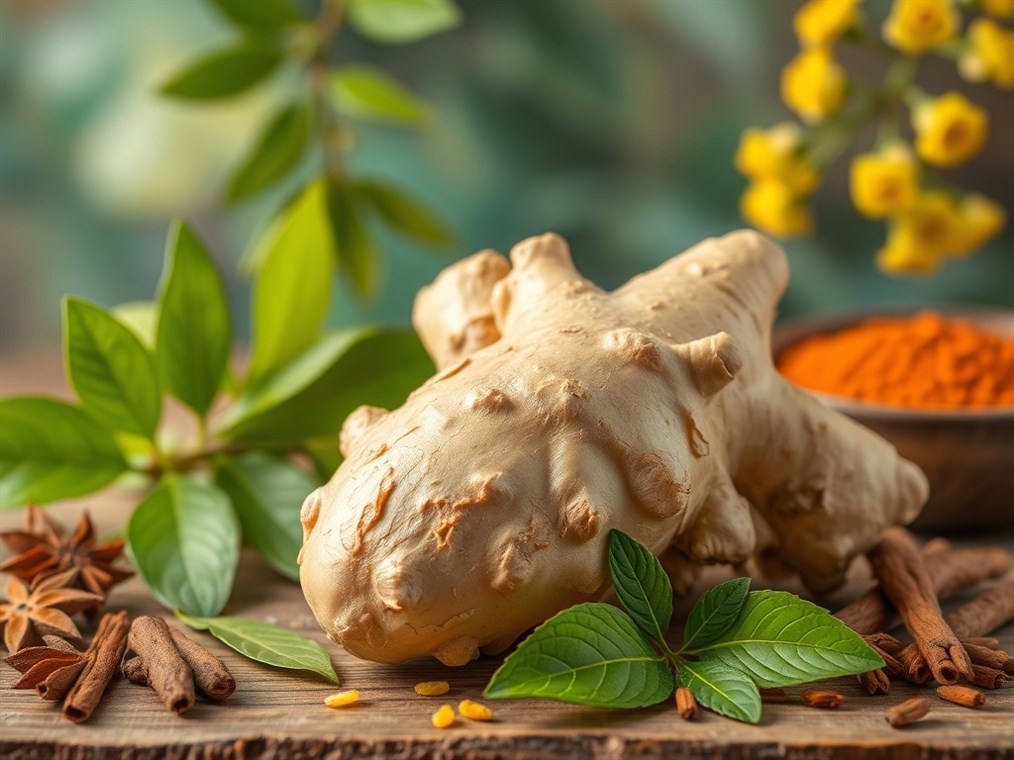Ginger: More Than Just a Spice, It’s a Wellness Wonder
Ginger. That knobbly, beige root sitting in your produce drawer? It’s so much more than just something you throw into stir-fries. For thousands of years, cultures around the globe have tapped into ginger’s incredible healing powers. Seriously, this stuff is practically a medicine cabinet in disguise!
Think back – our ancestors weren’t fools. Originating in Southeast Asia, ginger made its way around the world, becoming a staple in both kitchens and traditional medicine practices. In China, they saw it as a digestive superhero, especially helpful when the weather turned cold and damp. And get this: even the ancient Greeks knew what was up, munching on ginger wrapped in bread after meals to settle their stomachs. Pretty smart, huh?
So, what’s the secret? It all boils down to ginger’s unique blend of bioactive compounds, with gingerol leading the charge. Gingerol is the rockstar ingredient, packing a serious punch with its anti-inflammatory and antioxidant properties. But it doesn’t stop there! Shogaols, zingerone, and paradol also join the party, each contributing their own special talents to ginger’s impressive resume. Basically, these compounds work together to calm inflammation, fight off those pesky free radicals, and even influence brain activity. It’s like a well-oiled machine!
Now, let’s dive into the science. Forget the old wives’ tales – modern research is backing up what our grandmothers always knew.
First up: Nausea? Ginger’s got your back. Seriously, if you’re feeling queasy, reach for ginger before you reach for medication. Studies show it’s a champ at tackling nausea and vomiting, whether it’s morning sickness, chemo-related side effects, or just a plain old upset stomach. I remember when my sister was pregnant, she swore by ginger ale – it was the only thing that kept her morning sickness at bay! Gingerol actually speeds up digestion, helping food move through your stomach faster. Even the bigwigs at the American Academy of Obstetrics and Gynecology give ginger the thumbs-up for morning sickness.
Next, let’s talk inflammation. This is where ginger really shines. Those gingerols and shogaols? They’re like tiny ninjas, sneaking in and shutting down inflammatory pathways. Think of it as turning off the faucet on an overflowing sink. If you’re dealing with achy joints from arthritis, ginger might just be your new best friend.
And what about that sluggish feeling after a big meal? Ginger to the rescue! It’s a digestive dynamo, getting things moving and preventing that uncomfortable bloating. It even gets your saliva flowing, which is the first step in breaking down food.
But wait, there’s more! Ginger’s not just about tummy troubles. It can also give your heart a little love. A big study a few years back showed that people who ate ginger regularly had a lower risk of heart problems, high blood pressure, and even diabetes. And a more recent review found that ginger can help lower bad cholesterol and raise the good stuff. Who knew a humble root could be so good for your ticker?
Speaking of diabetes, ginger might also help keep your blood sugar in check. Some studies suggest it can improve insulin sensitivity and help your cells use glucose more efficiently.
And if you’re in pain, ginger might offer some relief. Whether it’s period cramps, sore muscles after a workout, or even a throbbing headache, ginger’s anti-inflammatory powers can help ease the discomfort. I’ve even heard of people using ginger compresses for back pain!
Believe it or not, ginger might even be good for your brain. Early research suggests it could help protect against diseases like Parkinson’s and Alzheimer’s.
Okay, so you’re sold on ginger. Now, how do you get more of it in your life? Easy!
- Fresh ginger: Grate it into stir-fries, soups, or smoothies.
- Ginger tea: Steep slices in hot water for a soothing drink.
- Dried ginger powder: Add it to baked goods, curries, or spice rubs.
- Pickled ginger: A classic palate cleanser with sushi.
- Ginger supplements: For a concentrated dose.
- Topical ginger: Look for ginger-infused oils or creams for sore muscles.
A word of caution: while ginger is generally safe, some people might experience mild side effects like heartburn or tummy trouble. And if you’re on blood thinners or have diabetes, talk to your doctor before taking ginger supplements. The FDA says up to 4 grams a day is generally considered safe.
The bottom line? Ginger is a powerhouse of goodness. And scientists are still discovering new ways it can benefit our health! So, next time you’re at the grocery store, grab some ginger and start experimenting. Your body will thank you for it!

